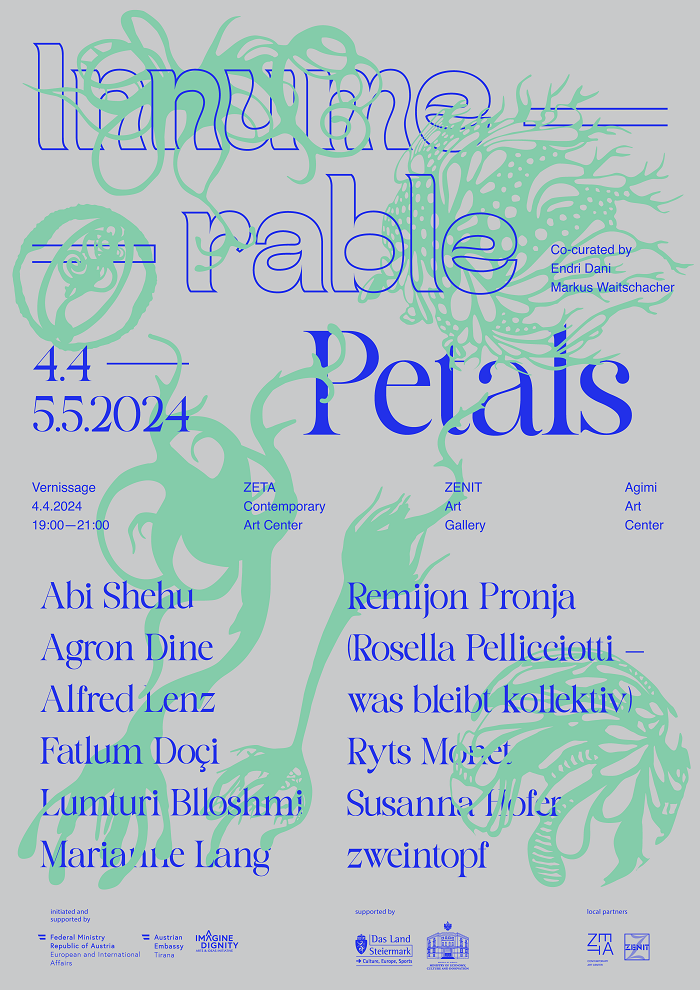Innumerable Petals
April 4—May 5, 2024
Co-curated by Endri Dani and Markus Waitschacher
Participating artists:
Abi Shehu, Agron Dine, Alfred Lenz, FatlumDoçi, LumturiBlloshmi, Marianne Lang, Remijon Pronja, Rosella Pelliccioti (Was bleibtkollektiv | Gentian Doda), Ryts Monet, Susanna Hofer, zweintopf.
Venues:
ZETA Contemporary Art Center
ZENIT Art Gallery
Agimi Art Center
Opening programme:
April 4
19:00
Vernissage #01
ZETA Contemporary Art Center
20:00
Vernissage #02
ZENIT Art Gallery
April 5
18:00
Along water’s path
Performance by Rosella Pelliccioti
(Was bleibtkollektiv | Gentian Doda)
19:00
Exhibition tour
with artists and curators
—
The curatorial orientation of this exhibition has its starting point in a casual encounter with a painting by the Albanian artist Agron Dine (b. 1948, Vlora), a painting that currently decorates one of the public institutions in the capital of Albania. The subject of this painting is several young people who are watering healthy, blooming flowers in one of the city’s parks. In the background of this landscape, a cluster of industrial buildings evidences the sharp contrasts between organicity and an idealized and alienated future that represents the modality of perception and imagination in the 20th century.
Modernity challenged humanity’s coexistence with other living things, drastically reducing green spaces and transforming them into urban spaces where—today—the struggle to erase the natural world has become even more intense and insensitive, thanks to practices of gentrification. These dynamics remained a source of fertile inspiration during the 20th century, and they continue to deeply appeal to many contemporary artists. Throughout human history, artists and thinkers alike have tried—as best they could—to understand the origin of living phenomena. In this collective exhibition, flowers (and other natural elements) serve as a catalyzing force embodying the concepts elaborated by the participating artists. Flowers function here as an analogy for the origin: the origin of fruits, of seeds, of forests, of all the history of material culture derived from the wood of those forests (from prehistory down to our present), and today flowers still possess great symbolic power—whether in mythology, religion, art, or politics.
The subjects of the works in the exhibition Innumerable Petals represent a serious effort to bring to light how certain natural elements have enriched the sphere of human emotions, an organic relationship that is threatened by modernity and its obsession with the endless accumulation of capital. The use of flowers as a metaphor for the origin, for the genesis or beginning (the Big Bang effect), likewise suggests the terminological metaphor of the ‘flowering’ of the new economies of the global South and their forms of contact and confrontation with the old, capitalist countries of the West.
Austria’s historical background—belonging to a Western European context—is characterized by a specific register of practices of domination. Whereas Albania, a small territory that had previously been occupied by several empires, would become completely isolated in the 20th century, experiencing acute limitations on autonomy imposed by the policy-making class (the Communist Party leaders and administrators). The developments of the 21st century are now homogenizing the fragmented modes of dominance of the past, pushing towards a planetary imperialism under the aegis of the term proposed by the academic world of the last century—universal capitalism.
This contemporary weakening of past modes of domination (for certain societies with an imperialist history), and the centralization of financial resources in a particular region of the globe, need not produce geopolitical fragmentation. Instead, it should generate new limbs or new buds of solidarity that might liberate society’s emotional sphere (as part of a unified social body) from the oppression of financial capitalism.
The effects of the transition from the industrial age into the digital one (when the man-machine is not made of stovepipes, turbines, and coal hoppers, but coaxial cables, motherboards, and sensors) are more evident than ever before on the natural environment. For this reason, the spaces of Innumerable Petals seek to become biological, ethical, and political laboratories.
The very title of the exhibition, Innumerable Petals, aims to weaken the dominance of numerical entities in the contemporary world. At the same time, the analogy of the flower as an origin provides the works on view with an organic vision of social progress, since the fertile dimensions of the organic universe have inspired the artists with morphologies and fantastic metamorphoses, revealing the intelligence of a non-human world mostly ignored by the human rationality that has brought us to the present chaos.
The fragility of the living world, and the title of the exhibition, raise a question that is as naïve as it is poetic: Isn’t it a sin to count a flower’s petals?
—
Throughout the duration of this first stage of this exhibition, two activities related to the curatorial orientation will also take place. At ZENIT Gallery, there will be a poetic evening where Albanian writer KrenarZejno is invited to make a selection of historical poems from the 20th and 21st centuries, where the subject of the poems predominates between flowers and politics. Additionally, at the ZETA Center premises, a musical evening will be held with folk songs from the city of Shkodër. The songs are the result of the intimate relationship of society with the courtyard as a source of fertile inspiration during the pre-industrial period.
—
This exhibition is part of “Imagine Dignity,” a flagship project of Austria’s international cultural activities, supported by the Styria region with primary sponsor Land Steiermark, Department 9 Culture, Europe, Sports. “Imagine Dignity” strives to contribute to shaping the future with artistic visions, creative ideas, and fascinating formats of dialogue between the arts, sciences, and economy.
In the fall of this year, this exhibition will travel to Austria.
